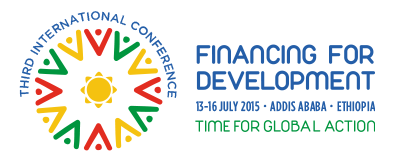The Co-Facilitators of the preparatory process for the Third International Conference on Financing for Development (FfD 3) have issued a revised draft Outcome Document, along with a compilation of views and comments from delegations.
These documents will serve as the basis for the next consultation session, taking place on 12-15 May 2015.
In their accompanying letter, Co-Facilitators George Talbot, Permanent Representative of Guyana, and Geir Pederson, Permanent Representative of Norway, also indicate the agenda and approach for the session.
 6 May 2015: The Co-Facilitators of the preparatory process for the Third International Conference on Financing for Development (FfD 3) have issued a revised draft Outcome Document, along with a compilation of views and comments from delegations. These documents will serve as the basis for the next consultation session, taking place on 12-15 May 2015. In their accompanying letter, Co-Facilitators George Talbot, Permanent Representative of Guyana, and Geir Pederson, Permanent Representative of Norway, also indicate the agenda and approach for the session.
6 May 2015: The Co-Facilitators of the preparatory process for the Third International Conference on Financing for Development (FfD 3) have issued a revised draft Outcome Document, along with a compilation of views and comments from delegations. These documents will serve as the basis for the next consultation session, taking place on 12-15 May 2015. In their accompanying letter, Co-Facilitators George Talbot, Permanent Representative of Guyana, and Geir Pederson, Permanent Representative of Norway, also indicate the agenda and approach for the session.
The zero draft of the outcome document was issued on 16 March 2015, and discussed at the second drafting session for FfD 3, on 13-17 April 2015. The revised outcome document, titled ‘The Addis Ababa Accord of the Third International Conference on Financing for Development,’ contains three main sections, addressing: a global framework for financing sustainable development; action agenda; and data, monitoring and follow-up.
The first section includes considerations related to progress achieved, remaining challenges and possible solutions. It also contains a sub-section on mobilizing support for the post-2015 development agenda, with paragraphs on: delivering social protection and essential public services for all; scaling up efforts to end hunger; establishing a new platform to bridge the infrastructure gap; and boosting financial access for micro, small and medium-sized enterprises.
The second section focuses on: domestic public resources; domestic and international private business and finance; international public finance; international trade as an engine for development; debt and debt sustainability; addressing systemic issues; and science, technology, innovation and capacity building. It highlights the need to hold open, inclusive and transparent discussions on modernizing the definition of Official Development Assistance (ODA), and on the proposed measure of “total official support for sustainable development” (TOSSD). It also includes language on gradually eliminating “inefficient fossil fuel subsidies for production and consumption, minimizing adverse impacts on poor and disadvantaged communities, taking into account the specific conditions of developing countries.”
The last section covers considerations such as: high-quality, timely and reliable disaggregated data; capacity building and improvement in data literacy; mechanisms for monitoring progress; and strengthening platforms for peer review mechanisms. It also includes a request to the UN Secretary-General to convene a high-level inter-agency Task Force to report annually on progress in implementing the Accord, and to advise intergovernmental follow-up on critical implementation gaps and recommendations for corrective action. It adds that the report on progress and critical gaps in implementing the global partnership for sustainable development will be considered by the High-level Political Forum on Sustainable Development (HLPF), “as part of the review mechanism to be established to monitor and review the implementation of the Sustainable Development Goals and its means of implementation.”
Pedersen and Talbot note that the revised draft outcome document is based on views and comments provided during the second drafting session, the joint session held with the fourth session of the post-2015 negotiation process (held on 21-24 April 2015) and written inputs.
The compilation document outlines comments and views provided by Member States and groups of countries on almost every paragraph of the zero draft outcome. Several comments are included on paragraphs of the zero draft, related to, inter alia: complementing initiatives to formulate and adopt principles for socially and environmentally responsible investment and business activities by appropriate national regulations (para. 40); remittances from overseas workers (para. 44); the need for developed countries that have not yet done so to substantially increase their ODA, starting immediately with a view to implementing by 2020 their ODA commitments (para. 56); encouraging developed countries to target ODA to the poorest and the most in need (para. 57); further strengthening South-South and triangular cooperation (para. 59); meeting existing commitments under international conventions, including on climate finance and other key global challenges (para. 60); the full and effective implementation of decisions regarding duty-free, quota-free market access, for products originating from the Least Developed Countries (LDCs) (para. 78); and technology, innovation and capacity building (para. 103).
The compilation document was circulated by email only.
According to the Co-Facilitators’ letter, the intersessional meeting from 12-15 May will facilitate a paragraph-by-paragraph reading of the revised draft, and evening sessions may be held as necessary, with a view of concluding negotiations on the Outcome Document by June. They also highlight: a session on a technology facilitation mechanism (TFM) and other science, technology and innovation (STI) issues to be held jointly with the Co-Facilitators of the post-2015 development agenda process, on the afternoon of Wednesday, 13 May; a meeting with the business sector on Tuesday morning, 12 May; and a meeting with civil society organizations on Wednesday morning, 13 May.
Additional intersessional meetings have been planned for 26-29 May 2015, and 1-5 June 2015 (if needed), with the third drafting session scheduled for 15-19 June 2015. [Co-Facilitators’ Letter and Revised Draft Outcome] [FfD 3 Drafting Process] [IISD RS Story on FfD 3 Intersessionals] [IISD RS Sources]